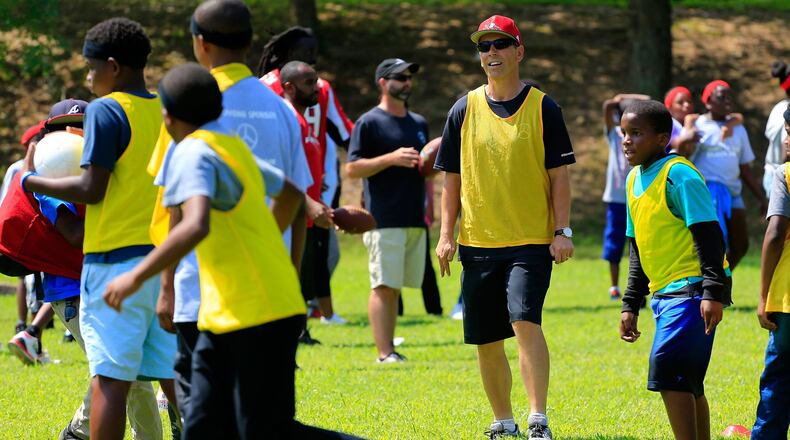Kendall Newson has been fishing since he was five years old.
Newson, his dad and brothers spent countless hours fishing for brim, crappie and bass at West Point Lake in LaGrange.
It became a game of one-upmanship to see who could reel in the most fish.
“It really helped me build confidence,” said Newson, a former NFL wide receiver and who now fishes competitively. “I knew I could catch fish, and I knew I was doing something that a lot of people couldn’t do. That made me really confident about going into a competitive atmosphere.”
Today Newson teaches fishing to African-American youth through his 10-year-old nonprofit, Teach a Child to Fish.
Young participants learn how to bait a hook, make lures and tie knots. The sports and mentoring program, though, not only teaches them about fishing but the importance of protecting the environment.
Recently, Newson’s nonprofit was selected along with 13 other after-school youth sports programs to receive $3 million over three years from the Laureus Sport for Good Foundation. The grants are funded by Mercedes-Benz USA.
Forty-five organizations applied for the grants.
Newson recently joined others including Olympian Edwin Moses and Dietmar Exler, CEO of Mercedes-Benz USA at Washington Park, which was temporarily turned into a giant playground with youths playing soccer, baseball, golf, lacrosse, biking and other sports.
The goal is to strengthen sports programs on the city’s Westside and make them more accessible for youth who live in the area that includes English Avenue, Vine City and Washington Park.
“The potential is unlimited,” said Moses, chairman of the Laureus Sport for Good Foundation and a member of the National Track and Field Hall of Fame. “Sports build life skills and can be used for social change. Laureus has been doing this all around the world.”
Moses said the group spent nearly two years talking with community leaders and residents about the best way to foster sports development.
Some of the challenges youth face on the Westside include violence, gangs, a lack of activities, jobs and drugs.
At the same time, research showed some of the barriers youngsters faced in playing sports included transportation, affordability, awareness, lack of volunteers and parental involvement.
In the end, it’s all about playing to win in life. Studies show that sports benefit the mind as well as the body.
The Aspen Institute’s Project Play looked at the benefits of school-age children who are involved in sports.
It found that regular physical activity not only makes for a healthier child but organized sports activity helps children develop and improve cognitive skills, enhanced concentration and improved classroom behavior. Physical activity also builds self-esteem and leadership skills.
However, Project Play found there are issues of accessibility and equity for minority children. Sport participation rates for white children exceeded that of African-Americans, Hispanics and Asians. Access is also influenced by income and geography.
Exler of Mercedes-Benz said his company’s involvement is simply the “right thing to do.”
It can’t be done, however, without a buy-in by the local community.
“The most effective way to help a community is when things come from within,” he said. “That is something that can’t be underestimated. There’s an old saying that rather giving people a fish, teach them how to fish.”
The mission, he said, is to give kids life skills that will allow them to function better in school and stay off the streets.
If not, “the odds are not in your favor.”
About the Author
Keep Reading
The Latest
Featured


